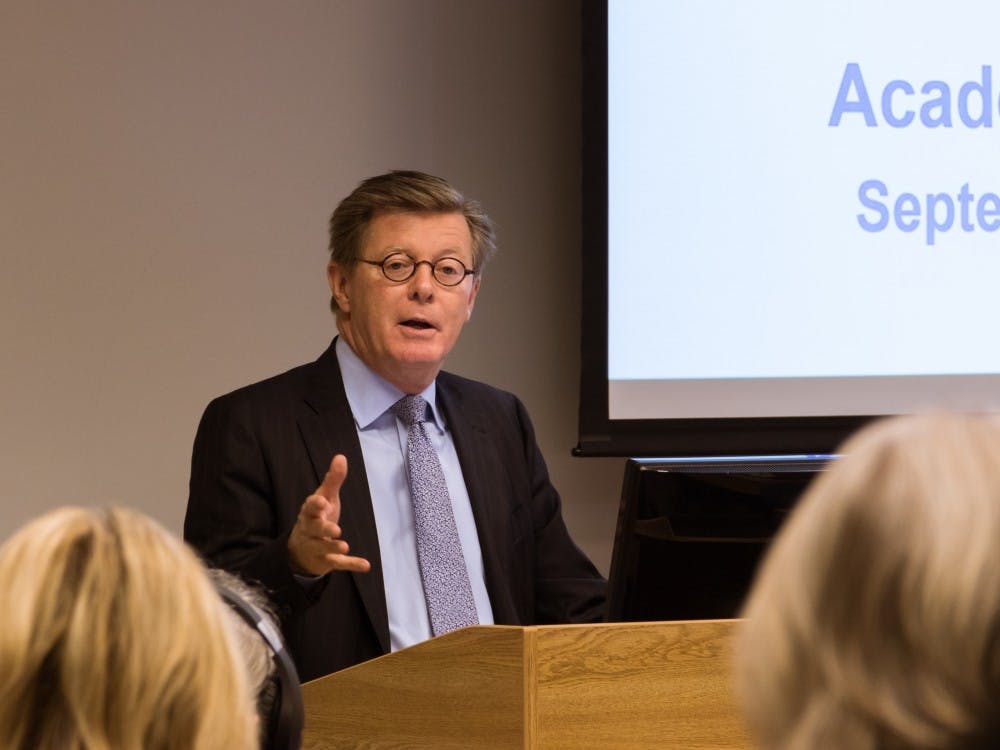In order to avoid any more research misconduct, Duke has taken several steps, like forming a new Office of Research. Another step? Having values.
At Thursday's Academic Council meeting, the first of the academic year, President Vincent Price addressed the faculty governance body, laying out a list of values to serve as a statement of Duke's commitment to integrity. He convened a committee to think about Duke’s guiding values, and they came up with five: respect, inclusion, trust, discovery and excellence.
"These are intended to be, at the highest level, a statement of our aspirations as a community," Price said.
Price mentioned that Duke, in fact, has multiple sets of values. The Duke University Health System had its own set of principles, and so did different units within it. The University had a list of values—trustworthiness, respect, diversity, learning and teamwork—from 1997 that were created by then-President Nan Keohane and was passed down to the next two presidents, Richard Brodhead and Price.
In 2018, Price said, the National Institutes of Health "expressed concerns" about Duke's research ethics and faculty accountability. Duke agreed to pay $112.5 million to the U.S. government in March 2019 because of a lawsuit alleging that Duke falsified data in applying for research grants.
Price told Academic Council that Duke now aspires for a culture of the "highest integrity" and of accountability, where faculty aren't afraid to speak up and ask questions. He wants the five values to serve as an umbrella for all of Duke and extend beyond research. They should be incorporated into residential life reforms, Price said, as well as a potential Duke 101 program for first-year students and faculty hiring.
After Price's speech, Ara Wilson, associate professor and director of graduate studies for gender, sexuality and feminist studies, pointed out that compensations are not evenly distributed among the five values. She said discovery and excellence are highly rewarded among departments and individuals, but neither inclusion nor diversity are endowed the same material value.
"That makes sense to me, that they wouldn't all receive material awards. But I just want to flag that in terms of making values attached to norms, the distribution of recognition and rewards matters," Wilson said.
Price responded in agreement, saying that Duke has to be willing to spend money on diversity and inclusion. He noted there are "ways large and small" to focus on those areas.
In other business:
Academic Council Chair Kerry Haynie, associate professor of political science, led the meeting, his first as chair.
"I think it was a good meeting, for the first meeting," he told The Chronicle afterward. "We have a big agenda coming up for the rest of the year."

Academic Council was planning to discuss changes to Appendix N of the faculty handbook—faculty ombuds and the faculty hearing committee—but that debate was pushed to their next meeting in October because of a mix-up that led to widespread confusion.
When the Executive Committee of Academic Council posted the amended appendix online for review, Haynie told the faculty the appendix had accidentally embedded the wrong changes to the document.
Get The Chronicle straight to your inbox
Sign up for our weekly newsletter. Cancel at any time.

Jake Satisky was the Editor-in-Chief for Volume 115 of The Chronicle.

